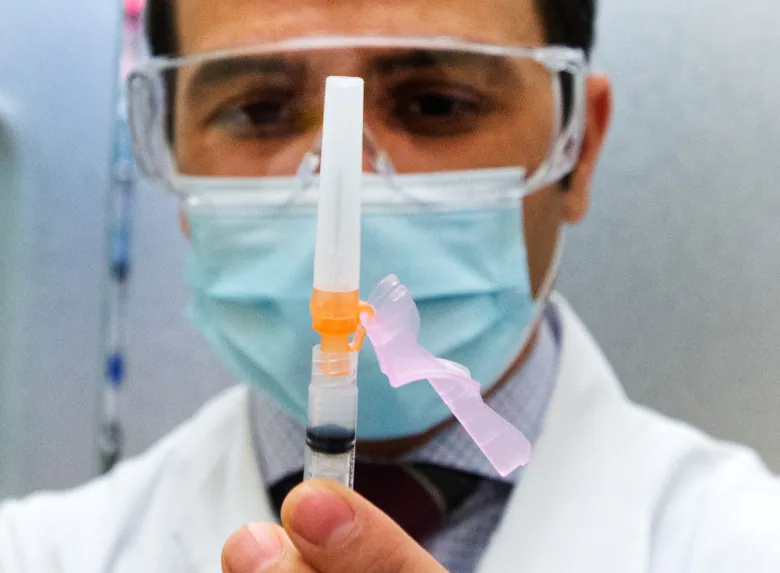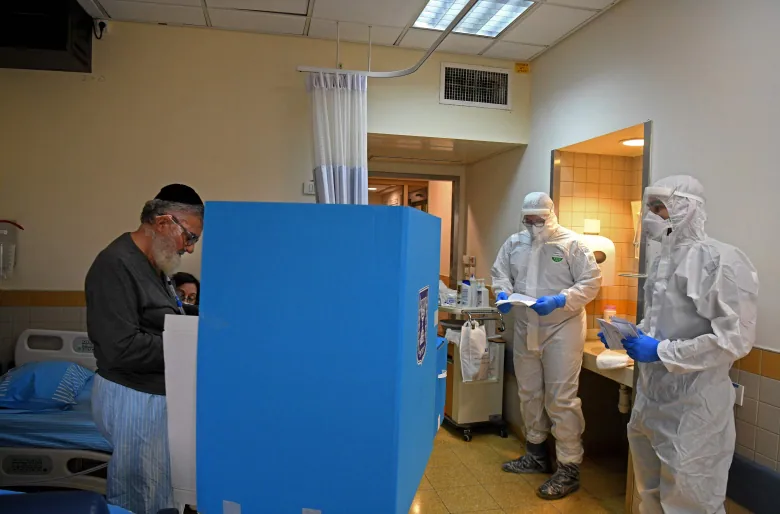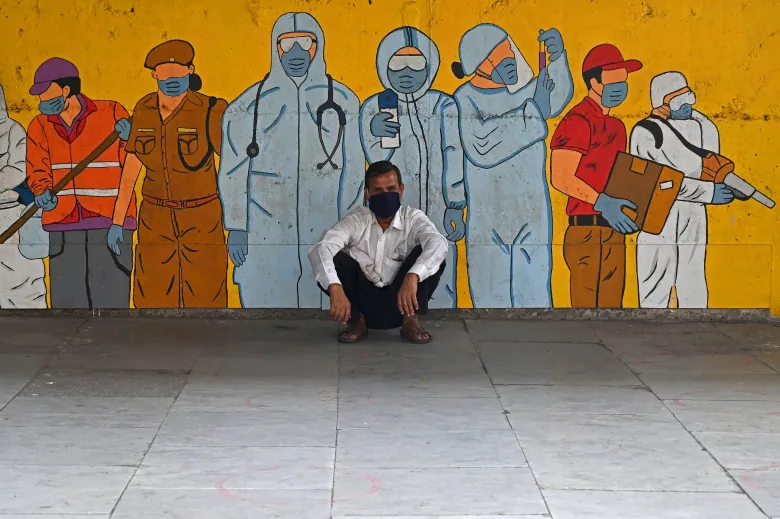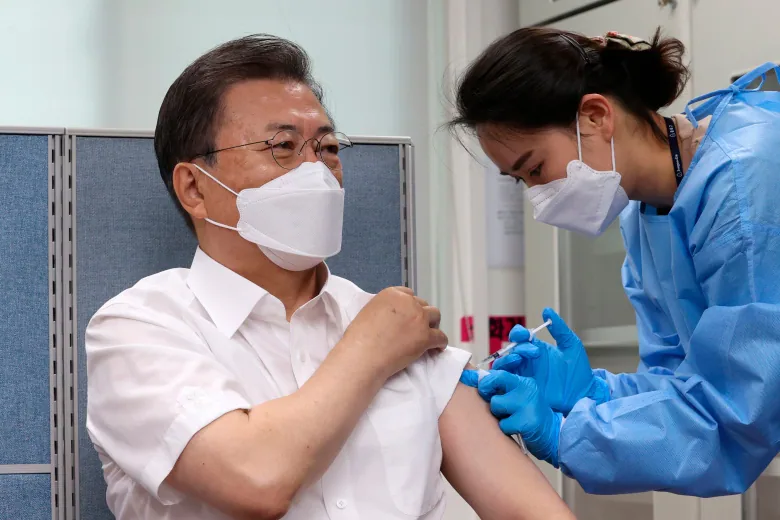The latest:
Canada’s top doctor says a rise in new strains of COVID-19 in Canada, including the B117 variant, is leading to higher average hospitalization rates and more severe outcome trends among younger people across the country.
At a press briefing on Tuesday, Chief Public Health Officer Dr. Theresa Tam said stronger evidence coming from the United Kingdom, where the B117 variant originated, shows this new strain can cause more severe illness in the elderly and in younger age groups.
She says if these numbers increase in the younger population, hospitalizations and visits to intensive care units are likely to increase.
Over the past week, there has been a further 15 per cent increase in COVID-19 daily cases, with an average of more than 3,600 new cases daily.
WATCH | Why some experts say Canadians should wear N95-style masks:
With more contagious COVID-19 variants on the rise, some experts believe the general public in Canada should be wearing N95-style masks, especially now that supply issues are less of a concern. 6:24
As of Monday evening, a tracking site maintained by federal officials showed there have been 5,117 reported cases of the B117 variant across the country.
Tam continued to urge Canadians to follow public health guidelines, as the countrywide vaccination program continues to roll out.
At the same briefing, a Health Canada official said Canadians should not be concerned about the safety of the AstraZeneca vaccine — even as a U.S. regulatory body raises concerns about the company’s clinical trial results.
Marc Berthiaume, director of Health Canada’s Bureau of Medical Sciences, said the issues flagged on Monday by a U.S. federal health agency relate to the product’s published efficacy rate, not to whether it’s safe to use.
– From The Canadian Press and CBC News, last updated at 2 p.m. ET.
What’s happening across Canada
WATCH | COVID cycling boom creates bike shortage:
Cycling has exploded in popularity during the pandemic and it has created a shortage in supplies — and not just for bikes, but also for their parts. The shortage is expected to last well into summer 2021. 2:10
As of 2 p.m. ET on Tuesday, Canada had reported 941,029 cases of COVID-19, with 36,139 cases considered active. A CBC News tally of deaths stood at 22,730.
In Atlantic Canada, Prince Edward Island reported two new cases of COVID-19 on Tuesday, both in people under the age of 19.
The island, which has not recorded any COVID-19-related deaths since the pandemic began, had eight active cases as of Tuesday, officials said.
In New Brunswick, health officials reported seven new cases of COVID-19. Nova Scotia, meanwhile, reported one new case of COVID-19, while Newfoundland and Labrador reported no new cases.
Ontario on Tuesday reported 1,546 new cases of COVID-19 and nine additional deaths. According to provincial data, the number of COVID-19 hospitalizations stood at 868, with 324 in intensive care units.
People aged 75 years and older in Ontario began booking their vaccine appointments on Monday through a provincial online portal and call centre, while pharmacies in three public health units started administering AstraZeneca-Oxford shots to those aged 60 and older.
In Quebec, Premier François Legault eased restrictions for schools and seniors’ homes as the province reported 656 new cases of COVID-19 and four additional deaths on Tuesday.
Hospitalizations in the province stood at 519, with 113 COVID-19 patients reported to be in intensive care units.
As of Monday, Secondary 3, 4 and 5 students in red zones will be able to attend school in-person full time. Right now, they alternate daily between being at school and online learning. And starting Wednesday, dining rooms can reopen in seniors’ homes where at least 75 per cent of residents have been vaccinated at least three weeks ago.

In the Prairie provinces, Manitoba reported 98 new cases and one new death on Tuesday as officials said they are keeping the province at the highest level of restrictions in the pandemic response system, though a few restrictions will be loosened beginning Friday.
The limit on outdoor gatherings, weddings and funerals is increasing to 25 people from 10, and the maximum capacity for stores is increasing to 500 people from 250, although stores may not exceed 50 per cent capacity. People will also be allowed to leave their vehicles while attending drive-in events.
The decision to keep the province at code red is due to feedback from Manitobans, concerns over rising numbers of more transmissible coronavirus variants and the need to maintain stability in the health-care system, the province said in a news release.
Meanwhile, in Saskatchewan, health officials reported 205 new cases of the illness caused by the novel coronavirus and no additional deaths. Concerns about a growing number of the more infectious COVID-19 cases in the Regina area have prompted some school divisions to restart online learning.
In Alberta, health officials on Monday reported 456 new cases and five additional deaths. The update came as Health Minister Tyler Shandro announced the province would not be moving into the next phase of its reopening, saying that will happen only when hospitalizations are under 300 and on a “clear downward trajectory.”
“Today, while hospitalizations are indeed below 300, they’ve risen in recent days,” he said Monday. “The decline that we saw in January and early February has stopped. Alberta now sits at 280 COVID hospitalizations, which is a rise of 16 from a week ago.”
WATCH | B.C health minister says indoor gatherings still a ‘major problem’:
B.C.’s health minister says indoor gatherings are driving new infections of COVID-19. 1:26
In British Columbia, the province’s top doctor again called on people to follow the current guidelines and not gather inside, pointing to the increased transmissibility of the B117 variant and saying it is “much easier to spread it with even minimal contact in indoor settings.”
Dr. Bonnie Henry said indoor gatherings of “any size” remain a risk and urged people to follow public health guidelines and only gather in small groups of up to 10 outside. Social gatherings of any size aren’t allowed inside homes with anyone outside one’s household or, for those who live alone, one’s core bubble.
The province, which doesn’t report updated COVID-19 figures over the weekend, on Monday announced 1,785 new cases and 16 more deaths over the last three days.
Across the North, Nunavut reported no new cases on Tuesday. The Northwest Territories and Yukon have not yet reported updated figures for the day.
– From CBC News and The Canadian Press, last updated at 2 p.m. ET
What’s happening around the world

As of Tuesday afternoon, more than 123.8 million cases of COVID-19 had been reported worldwide, with 70.2 million cases listed as recovered, according to a tracking tool maintained by Johns Hopkins University. The global death toll stood at more than 2.7 million.
In Europe, the French hospital system could face an “unprecedented violent shock” in about three weeks if the country fails to curb its vertiginous rise in cases, the president of the French hospital federation said.
A leading European Union official has lashed out at AstraZeneca for its massive shortfall in producing vaccine doses for the 27-nation bloc and threatened that any shots produced by the company in the EU could be forced to stay there.
Sandra Galina, chief of the European Commission’s health division, told legislators on Tuesday that while vaccine producers such as Pfizer and Moderna have largely met their commitments, “the problem has been AstraZeneca. So it’s one contract which we have a serious problem.”
The European Union has been criticized at home and abroad for its slow vaccine rollout, standing at about a third of jabs given to their citizens compared with countries like the United States and United Kingdom.
Galina said the overwhelming responsibility lies with the AstraZeneca vaccine, which was supposed to be the workhorse of the drive, because it is cheaper and easier to transport and was supposed to be delivered in huge amounts in the first half of the year.
“We are not even receiving a quarter of such deliveries as regards this issue,” Galina said, noting that AstraZeneca could expect a response from the EU. “We intend, of course, to take action because, you know, this is the issue that cannot be left unattended.”
The EU already closed an advance purchasing agreement with the Anglo-Swedish company last August for up to 400 million doses.
Meanwhile, Germany is extending its lockdown until April 18 and calling on citizens to stay at home over the Easter holiday to try to break a third wave of the pandemic, Chancellor Angela Merkel said, as the country races to vaccinate its population.

In the Asia-Pacific region, with new infections on the rise the past few weeks, India will start vaccinating everyone over the age of 45 starting on April 1.
Federal information minister Prakash Javadekar made the announcement on Tuesday, when more than 40,000 new cases were detected in the last 24 hours. Most infections are in Maharashtra state in India’s western coast. But cases have spiked in other states like Punjab, Gujarat, Chhattisgarh, Karnataka and Tamil Nadu.
South Korean President Moon Jae-in has received his first shot of AstraZeneca’s vaccine as he plans to attend June’s Group of Seven meetings in Britain.
Moon received his shot on Tuesday at a public health office in downtown Seoul, along with his wife and other presidential officials who plan to accompany him during the June 11-13 meetings.
Moon’s office said he was feeling “comfortable” after receiving the shot and complimented the skills of a nurse who he said injected him without causing pain. The office said Moon will likely receive his second dose sometime around mid-May.

South Korea launched its mass immunization program in February and plans to deliver the first doses to 12 million people through the first half of the year, including elders, front-line health workers and people in long-term care settings.
Officials aim to vaccinate more than 70 per cent of the country’s 51 million population by November, which they hope would meaningfully slow the virus and reduce risks of economic and social activity.
In the Americas, Dr. Anthony Fauci is warning that a surge of coronavirus cases in Europe could foreshadow a similar surge in the United States. Fauci, the nation’s top infectious disease doctor, is urging Americans to remain cautious while the nation races to vaccinate its citizens.
In an interview on ABC’s Good Morning America, Fauci said he is “optimistic” of the vaccines’ effectiveness and expressed hope that AstraZeneca’s vaccine could join the arsenal of inoculations.
He deemed it an “unforced error” that the company may have used outdated data in a clinical trial, perhaps casting doubt on its effectiveness. But he says Americans should take comfort knowing the FDA would conduct an independent review before it was approved for use in the United States.
Uruguay confirmed that it had detected the presence of two coronavirus variants that originated in neighbouring Brazil as the tiny South American nation faces a spike in cases and deaths.
In Africa, Nigeria suspended the airline Emirates from flying into or out of its territory last week after the carrier imposed additional COVID-19 test requirements on passengers from the country, the aviation minister said.
In the Middle East, the United Arab Emirates said unvaccinated private-sector workers in five industries must get a PCR test every two weeks, in a bid to encourage vaccine uptake.
– From The Associated Press and Reuters, last updated at 12:15 p.m. ET





